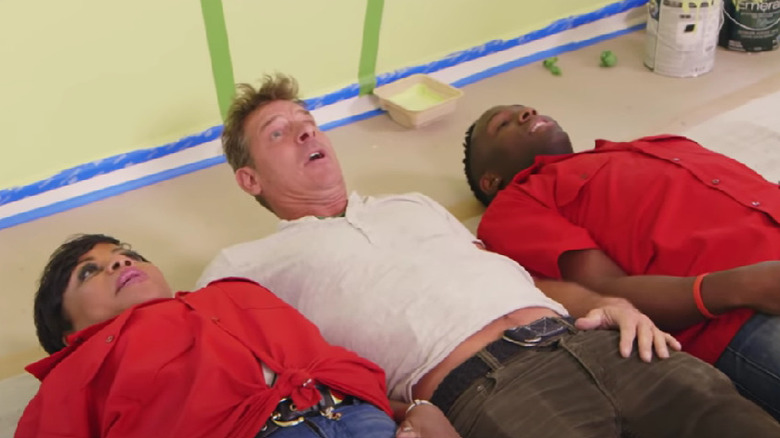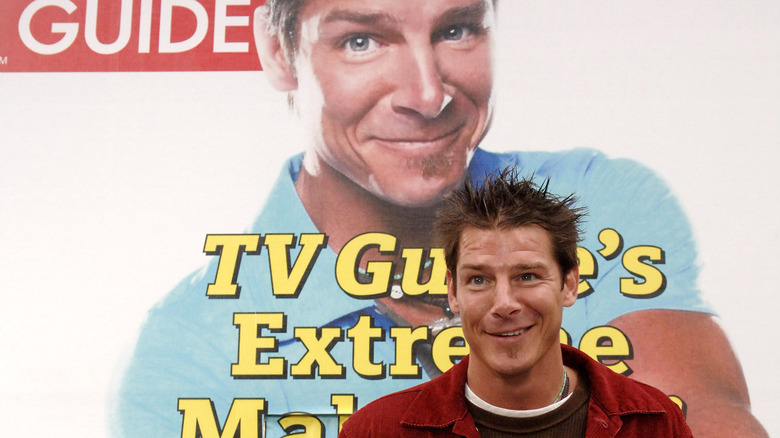The One Thing HGTV's Ty Pennington Regrets Not Doing At The Start Of His Career
Ty Pennington didn't set out to be the OG face behind the DIY movement. As one of the first carpenters to sign on to TLC's "Trading Spaces" in 2000, he probably thought he would help renovate homes and maybe show up on camera a handful of times. Who could have guessed that his infectious personality and handyman know-how would motivate hundreds of homeowners to pick up their own tools?
Clearly, not Pennington, who regrets one thing he didn't do at the start of his career — buying stock in Home Depot. Speaking to Yahoo Entertainment, the craftsman said, "Not only would I not have predicted this, but if I had, I would have bought in stock in Home Depot immediately. It's crazy how it created a genre ... It was the first show to put actual tools in the hands of homeowners." Pennington continued, noting that his smash-hit show gave regular people the confidence to say, "'Let's do it ourselves,'" creating what he calls "an entire DIY craze."
While Home Depot stock has had its ups and downs, there's no denying that home improvement stores pivoted from somewhere only skilled tradesmen frequented to places regular homeowners could flock to for tools, materials, and anything else they might need to tackle their DIY projects. Over the decades, Home Depot has seen sky-high earnings with only a few minor falls, much like Pennington's career.
How did Ty Pennington rise to fame?
Like the rise in popularity of DIY shows, Ty Pennington's career has largely been on an upward trajectory since his early days on "Trading Spaces." Before he was famous, his handyman work was simply a way to earn money on the side, not Pennington's ultimate career goal. But after agreeing to be a part of the TLC show, it became apparent that his charming personality and excellent craftsmanship could make construction much more than a side gig.
After three years with the program, Pennington said, "I had to quit that job because I knew I was worth more than I was being paid," (via People), leaving him available to host ABC's memorable "Extreme Makeover: Home Edition." As a host, he received more airtime, essentially becoming "the face" of home renovation. Today, Pennington may be synonymous with HGTV, but he actually didn't start on the network until much later in his career. Nevertheless, as he explained to Yahoo Entertainment, "When I meet new people on HGTV, they're like, 'Oh my God, you're the OG.'" For HGTV, Pennington has appeared on shows like "Ty Breaker," "Battle on the Beach," and "Rock the Block."
Like The Home Depot, Pennington has had a few downturns in his illustrious career, like when he had a run-in with the law, or when his talk show "The Revolution" was canceled. But he didn't let minor misfortunes stop him, as today he has quite a lengthy TV resume of shows.
When will the DIY craze end?
It's hard to imagine a time when DIY and its major players, like Ty Pennington and HGTV, might not be popular. While it could happen, reports show that it might not occur soon. And we have millennials to thank for that. One study by the Farnsworth Group noted that "73% of Millennials are DIYers," and "about every three in four homeowners DIY." But what can we say? Us '90s kids grew up in the heyday of home renovation and improvement shows like "Trading Spaces." We can still recall Bob Villa, the real OG of home improvement, in commercials for Sears power tools.
Maybe Pennington should still consider purchasing stock in Home Depot because, for millennials, DIY house improvement might only decline when you have to pry the hammer from our cold, dead fingers. And as long as we're still lapping up the house-flipping shows, Pennington shouldn't see a decrease in his popularity, either. You can still flip on HGTV to find Pennington working his charm, like in his latest appearance on "Barbie Dreamhouse." Pennington's career may not have been the one he envisioned, but we can't imagine he has any regrets about the path he's taken (minus the lack of Home Depot investment).


